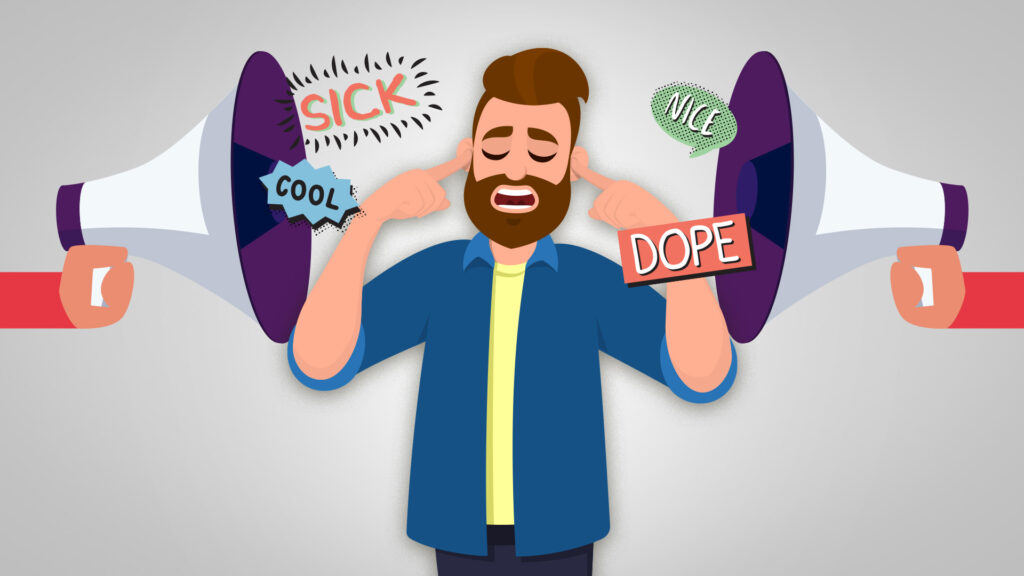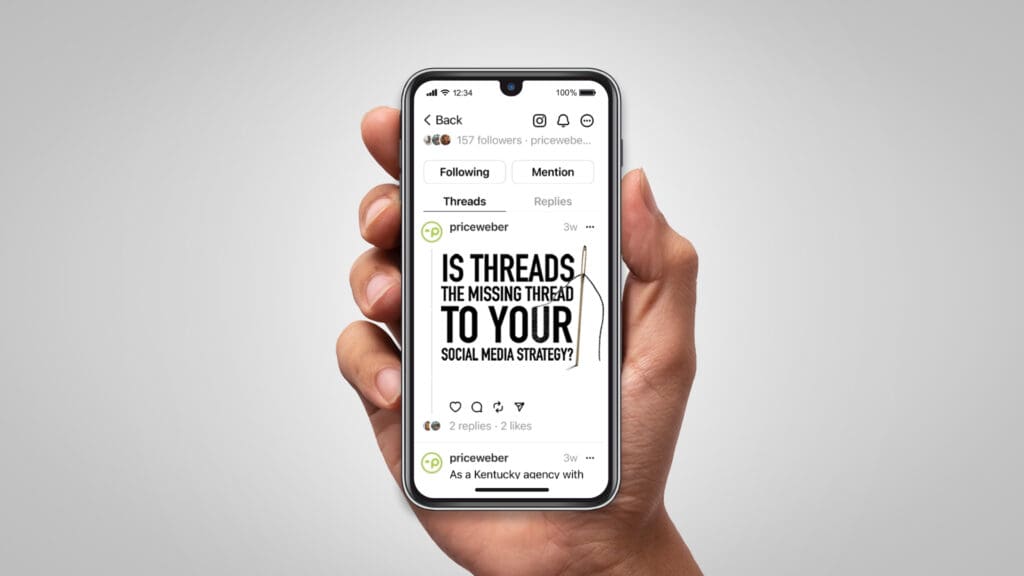
It’s Time to Elevate Social Media in Your Marketing Strategy
Love it or hate it, social media is more than just a way to connect with friends online. Many of us remember when Facebook first began, before Business Pages or Newsfeed Ads. Social media 15 years ago was very different from today. Now, businesses can no longer afford to ignore their social presence.
In this edition of Plain Talk, we’ll walk you through why elevating social media in your marketing strategy is more important than ever and what you should do about it.
- Breaking Down the Numbers
- 8 Reasons to Use Social Media in Your Marketing Strategy
- Examples of Companies Using Social Media in Their Marketing Plan
- Get Expert Help Using Social Media in Your Marketing Strategy
Each day, social media continues to change at a rapid pace. Social media platforms once considered trends, like Facebook, Twitter, LinkedIn, and Instagram, are now seen as legitimate media channels. Businesses can use these platforms to engage with their target audience and generate strong results for their organization.
The time is now to either get on board or be left behind. Gone are the days where you could develop a marketing plan without social media included. Good businesses know that today, more than ever before, social media is a very important part of your overall plan. In order to stay ahead or even just keep up with your competitors, you have to be part of the conversation happening online.
Breaking Down the Numbers
The COVID-19 pandemic has had an impact on everyone and everything this year—including social media. As people began social distancing and staying home more, engagement on social media platforms saw a boost, with 46–51% of adults in the United States using social media more, according to The Harris Poll, which conducted a survey between late March and early May. The same poll found that this year alone, social media users were expected to spend seven more minutes a day on social media than they did in 2019. What does this mean for you? Opportunity.

This year, a poll from digitalcommerce360.com also found that 82% of the 4,500 people they questioned indicated that social media is the most common channel to get information about a product or brand, and 62% agreed that social media presence does impact their decision to purchase from a brand. That means more than 6 out of every 10 people are looking at your social media channels before they buy your product, invest in your company, support your cause, etc. They are taking the time to get to know you online, and if you aren’t there to engage that interest or conversation, they are likely moving on to another company or organization that is.
8 Reasons to Use Social Media in Your Marketing Strategy
In addition to connecting you with your audience, how can using social media in your marketing strategy help?
1. Brand awareness
You can reach a new audience with your content and also stay top of mind, so people will think of you when buying a product or supporting an organization. According to the Pew Research Center, a majority of Facebook, Instagram, and Snapchat users report checking these three sites multiple times a day. That means, multiple opportunities to reach your audience. Make sure you are on the platforms that make the most sense to your brand and that you are reaching your target audience. You can also maximize your reach by investing in Newsfeed Ads or boosting posts with dollars to help you reach additional people and grow your current and potential customer base.

2. Show the human side of your brand
How are customers using your products? What does your company stand for, and is your company living up to your customer promise? Social media is where you can tell your story, and the story of your customers, to help your audience see the human side of your brand.
3. Showcase your thought leaders
Another great way to build consumer trust is to showcase the thought leaders in your field. An estimated 96% of B2B companies want more content from industry thought leaders, which is where your company comes in to help. Offer up your thought leaders on social media platforms like LinkedIn to help set your business apart from others.
4. Tell your story
I often hear business leaders say, “I don’t understand why media won’t tell our story,” and I remind them of the importance of social media. Your social media channel is your own news network. It is your way to get your message out there in the way that you prefer. It is your chance to tell your story.
5. Improve your website SEO
If you want to improve your website search engine optimization (SEO), you can do this with help from your social media pages. Linking to your site from your social media pages and posts will help drive people back to your site to make purchases or learn more about your product. This can lead to a boost in sales and revenue, and improve your overall SEO.
6. Reputation management
Make sure you are online to control what people are saying about your company or brand. If you have a page that you never keep up with, you are not managing your company’s reputation and the comments being made about you, which can be very dangerous during the Social Media Era. This also means when potential customers look at your page and see that you aren’t engaged or aren’t responding to criticism, they will think of your company as one that just isn’t invested in its consumers or brand. Make sure you are online consistently and managing any positive or negative feedback that may come your way.
7. Be engaged
You can’t just click “like” on every visitor post and expect for your company to stand out among others. It’s important to invest in social media and to engage with your fans or those following your pages. Remember in 2019 when a bridesmaid posted to Twitter that she forgot her bridesmaid dress as she was heading to her friend’s wedding in Costa Rica? She tagged Southwest in the post, and the company very well could have written back saying, “We’re so sorry to hear this. We hope the rest of the trip is better for you.”
Instead, Southwest went above and beyond to engage with the customer, show her they were listening, and actually help. They sent the dress on a separate flight so that it made it to the wedding in time, and as a result, Southwest went viral for all the right reasons for how it handled this situation.
8. Crisis management
Is your company going through a crisis? Did a situation happen with your business that is quickly going viral for all the wrong reasons? The first places people will look are your social media pages, and you need to have a plan in place for when this happens. Learn more about handling a crisis situation on social media by clicking here.
Examples of Companies Using Social Media in Their Marketing Plan
While we could chat all day about companies that are doing well on social media, I’ll pinpoint a few that have been able to really stand out when it comes to how they are executing social media to see strong results.
Popeyes
In 2019, the fried chicken restaurant launched a new chicken sandwich that led to other restaurants like Chick-fil-A posting about their own chicken sandwiches, with Chick-fil-A stating it had the original. In two words – “Y’all good?” – a chicken war was underway, and the post was retweeted more than 86,000 times. The sandwich sold out within two weeks, and sales at Popeyes restaurants grew 10.2% in the United States during the third quarter. All because the Popeyes social media team saw an opportunity online, engaged with another brand, and helped with their online awareness campaign. As a result, they drew in new customers, me included, who wanted to try the new chicken sandwich. “Y’all good?” Smart move, Popeyes.
National Geographic
As the number one brand on social media, National Geographic has content that is authentic and real, giving its followers just what they expect from the brand – beautiful images from across the world and stories they possibly wouldn’t have known about before following the page. The National Geographic social media pages are helping spark conversations about causes, like World Oceans Day, to highlight issues and spark dialogues to help change the world for the better, and encourage engagement and action. They are true to their brand, and each awareness campaign is generating millions of engagements and impressions. One campaign aimed at National Agriculture Day garnered 95.6 million impressions and 2.3 million engagements, helping facilitate a dialogue on the way food is produced and consumed.
Coca-Cola
You probably remember when Coca-Cola rolled out its “Share a Coke” campaign on social media in 2011, encouraging its fans to #ShareACoke. Maybe you even purchased a 20-ounce bottle with your name on it. The company already had a strong audience but wanted to create a stronger and more personal relationship with its younger audience, so it added some of the most popular names to its bottles and rolled out the campaign first in Australia. More than 250 bottles were sold there in one summer, and it became a global campaign, as well as one of the most successful social media campaigns as people posted photos of the product with the dedicated hashtag, #ShareACoke.
Get Expert Help Using Social Media in Your Marketing Plan
So, you are ready to take your company to the next level and start a social media page. What’s next? Deciding what platforms make the most sense for your brand.
There are some businesses that should be on all platforms, and others that really only belong on one or two channels, depending on the type of content they will be sharing. If the social media channels you select for your content aren’t the right fit, you will not be effectively reaching your audience. It’s important to know what channels are right for your content, choose what your key pillars will be to get your message across, determine the way in which you will share content (photos, videos, gifs, etc.) and decide how often your company should be posting to social media.
While this first step may seem simple enough, it can often be the hardest for businesses if they don’t understand the difference between social media platforms and audiences. That’s where a social media team can help.
If you have any questions or are ready to take the next step and help your business generate awareness, sales, and revenues on social media, we’re here to help. Give us a call at 502-499-4209 or contact us here, and we’ll be happy to help.
Our Articles Delivered
Signup to receive our latest articles right in your inbox.






